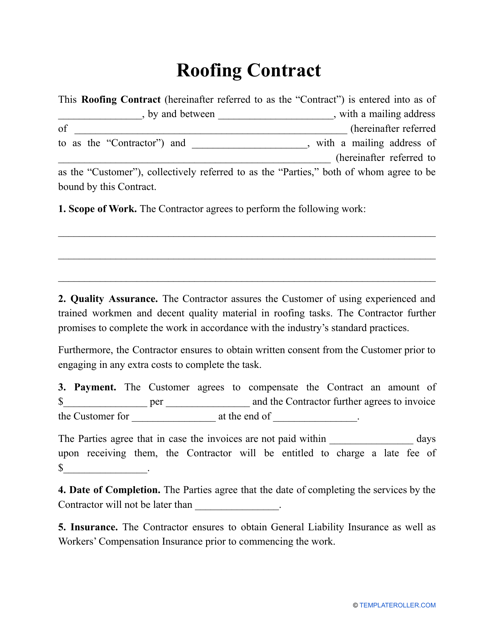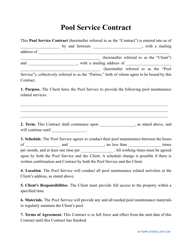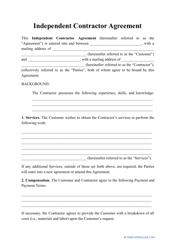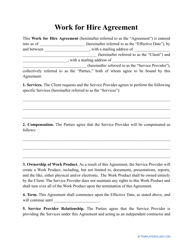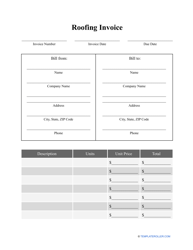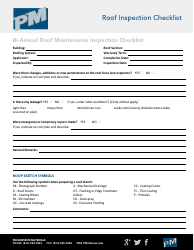Roofing Contract Template
Any work carried out on your roof requires professionals to carry out high quality work, where they are obliged to meet the demands on the agreement set out beforehand. A Roofing Contract turns this agreement into a formal obligation. It makes the contracted company hold responsibility for the quality and execution of the job, whilst the client pays the company a fee for the executed work.
Alternate Names:
- Roof Contract;
- Roofing Agreement;
- Roofing Contract Agreement.
There are several advantages to signing a contract. Not only does it guarantee payment from the side of the customer and job completion from the side of the contractor, it also protects the rights of both parties in cases where:
- A customer may keep backtracking from an agreement. This is especially problematic if work on a roof has already begun.
- Contractors experiencing severe weather conditions during work.
- Financial disagreements.
- Deadlines for work are not met.
Either way, signing a Roof Contract is legally binding and can be used in cases of disagreements to resolve any conflicts.
A Roofing Contract template can be downloaded using the link below.
What Should a Roofing Contract Include?
A simple Roofing Contract should always include:
- The name and address of both the business and customer;
- Financial information regarding payment schedule and costs involved;
- Information regarding when the contractor will commence work and the deadlines for work completion;
- Full information on the work that will be carried out along with information of the various methods in which this work will be performed (installation, materials, etc.).
How to Write a Roofing Contract?
If you want to write a Roofing Contract from scratch, take a blank Roofing Contract and consider the following details:
- Information about the business . This should include basic information about their address, details of insurance and license.
- Information about the customer . Their name, address, contact details and details about the property where the work will be carried out (if this differs from their actual address).
- Details about the agreed work . As much information as possible regarding the specifics of the work required to be carried out.
- Work deadlines and duration . This requires honesty and clarity from the side of the contractor.
- Materials and extra services . Perhaps there may be additional fees for removing and/or disposing of materials and general waste leftover from the work.
- Warranties associated with the carried out work.
- Financial scheduling . If a deposit is required, details of this should be included in this clause along with information about the subsequent payments.
- Details regarding unforeseen circumstances . This can include things such as adverse weather, along with details regarding additional work in situations where unprecedented issues occur.
- Information about amendments to work : specifically the conditions.
- Contract termination . In this clause there should be complete clarity in regards to financial reimbursements, including information on deposits and the period of notice in which the customer should inform the contractor of such decisions.
How Long Is a Roofing Contract Good For?
The contract itself is valid up to the period of completion, providing both parties are satisfied with the results of the job. However, it is also important to be aware of and take into account the warranty provided by a contractor before signing any contracts. After all, any jobs carried out on a roof may last a lifetime (providing it is correctly maintained), but another key factor is the quality of workmanship on the side of the contractor.
Warranties vary from 2 years anything up to 50 years. It is important however to be aware of what is covered in such warranties. Often, warranties exclude things such as adverse weather damage and faults in materials from the manufacturer (although these usually have a separate warranty).
Ideally, you would want your workmanship warranty to be as detailed and extended as possible.
How to Get Out of a Roofing Contract?
Just like any other standard contract, it is possible to get out of a Roofing Contract, particularly if you have found yourself in the hands of a bad contract.
It is possible to terminate an existing contract, providing it meets appropriate criteria. First of all, if there have been any breaches of contract (from either party), this provides an opportunity to cancel the agreement. Usually, there is a period of notice in which the customer (or contractor) must comply with and inform the second party of intent to cancel an existing contract. This document has to include the reasons as to why the party decided to terminate the contract and outline any specific clauses that were violated.
All this information should be included in a separate clause in the contract. In most cases, companies outline a 'cancelation fee' which obliges the customer to pay a fraction of the agreed sum (usually approximately 25%), in case the customer decided to terminate a contract.
Sometimes, after work has commenced, it is not uncommon for contractors to discover problems such as rotting, which need to be eliminated before work can commence. Naturally, this includes additional fees which need to be outlined in the contract.
There are also instances when either party is within right to terminate a contract after completion of work. Of course, in most cases this includes instances when a party feels that the agreed upon demands have not been met appropriately and are unhappy with the result of the work, or there are financial disputes between both parties.
In any case, it is important to draft a carefully planned out and detailed contract to prevent any disputes or conflicts.
Haven't found the template you're looking for? Take a look at the related templates below:
